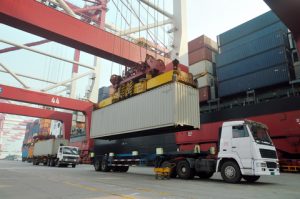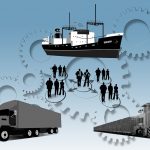Will ILWU Opposing Automation Cause Port Disruption?
 Despite the fact their Master Contract permits port automation by terminal operators, the International Longshore & Warehouse Union (ILWU) is fighting hard against APM Terminals’ plan to automate its Pier 400 terminal at the Port of Los Angeles.
Despite the fact their Master Contract permits port automation by terminal operators, the International Longshore & Warehouse Union (ILWU) is fighting hard against APM Terminals’ plan to automate its Pier 400 terminal at the Port of Los Angeles.
The ILWU isn’t one to let a little thing like no legal grounds prevent it from fighting automation, so the union has been staging protests while trying to get the Los Angeles Board of Harbor Commissioners to turn down APM Terminals’ construction permit.
Shippers worry that this fight may escalate from protest marches and appeals against automation to ILWU slowdowns and strikes at the ports. Adding to these fears, one local news outlet apparently even misreported the ILWU’s actions today (Tuesday, April 16th, 2019) as a strike:
Board of Harbor Commissioners Postpone Vote on Pier 400 Automation Permit
What happened today is that the union succeeded in delaying (and not for the first time) modernization upgrades at Pier 400 for at least another month.
The Board of Harbor Commissioners was supposed to vote on whether or not to uphold the previous approval of a coastal development permit for APM Terminals to upgrade Pier 400. Thanks to a letter the board received today from Los Angeles Mayor Eric Garcetti, the vote was postponed for 30 more days (in what is basically the repeat of events that happened a month ago), Donna Littlejohn reported in the Press-Telegram.
ILWU March Against Automation a Short-Term Success
Leading up to today’s (Tuesday, April 16th, 2019) would-be vote, the ILWU scheduled a march that the union said would have over 2,000 marchers, including local political leaders and Uber and Lyft drivers, who are trying to form a union themselves.
While I’ve seen no confirmed numbers of how many marchers there actually were this morning, the march did take place, with the below Twitter post by Press-Telegram photojournalist Brittany Murray showing video of marchers chanting, “Who are we? ILWU!”
The event was a bit anticlimactic as Littlejohn describes the result of the vote being postponed as follows:
Audience members, who were up early to get to the meeting on time, appeared disappointed in what amounted to a five-minute announcement following all the buildup.
Even though there was disappointment from the crowd upon hearing the vote was postponed, this should be seen as something of a victory for the ILWU, which is showing its strength in delaying the modernization and automation of Pier 400.
Murray tweeted another video of ILWU Vice President Gary Herrera encouraging his union members after the event, saying:
Every time we show up in numbers, every time we come, what they do is they get a little bit more nervous and nervous and nervous…. What’s happening today is they’re nervous, guys…. They need to do what we asked them to do. And what did we ask? We asked that they go back to their table, and they get more information. That they see the effects of what it’s going to do to our surrounding communities. What they’re gonna see the effects what’s gonna happen to the work force [sic.]. We asked for that, and we’re getting it right now.
Were Lessons Learned from ILWU Actions at the Port of Portland?
There’s good reason for nervousness when the ILWU gathers disgruntled about something.
Think back about when the ILWU got disgruntled over just two jobs at the Port of Portland traditionally belonging to another union. Despite it being against their contract and court orders, the ILWU local 8 repeatedly slowed down and shutdown port operations until Hanjin—back when it was still a major ocean carrier and handled almost 80% of the cargo shippers imported and exported through the Port of Portland, stopped calling on the port.
That obviously hurt shippers whose best practices were shipping through the Port of Portland; hurt the local economy; hurt the port; hurt the struggling Hanjin, which eventually went bankrupt; and hurt ILWU dockworkers who lost their jobs. All of that hurt was over two jobs plugging in and unplugging reefer containers.
The ILWU effectively shut down containerships calling on the Port of Portland over not being given two jobs that traditionally never belonged to the union. How much more would the ILWU be willing to flex its power over the risk of losing jobs that traditionally belong to it through automation?
ILWU Tries to Circumvent Master Contract to Fight Automation
This permit, which is usually just perfunctory, for the Pier 400 modernization construction was originally approved back in January, but afraid automation resulting from the upgrades would cost union jobs, the ILWU immediately appealed. While the Portland fiasco shows the union isn’t above taking action against its contract, ILWU obviously can’t fight the modernization and automation on the grounds of its Master Agreement. As mentioned above, the Master Agreement permits automation, so on what grounds is ILWU leadership appealing the permit?
Chris Dupin answers that in an American Shipper article:
They are asking for an expansive reading of the CEQA regulation, saying that the economic impact of job losses at the facility on the surrounding community should be taken into account as part of the environmental impact of the changes APMT wants to make.
In other words, the ILWU is arguing that the loss of jobs caused by automation is an environmental issue, and this permit should, therefore, be denied on environmental grounds.
I don’t want to say that argument makes no sense, so let’s just say from a legal and logical perspective, the ILWU’s argument for its appeal does not seem to hold water (which might be something of importance out on the docks).
While there is certainly interplay between economic and environmental issues, they are separate. Job loss is an economic not an environmental issue. When it comes to the modernization APM Terminals proposes for Pier 400, the construction would actually result in a reduction the terminal’s environmental impact.
It’s hard to see any honest hearing of this appeal resulting in anything other than rejecting the appeal and approving the permit. That’s why each delayed vote is a win for the ILWU.
ILWU & APM Terminals Talk During Permit Delay
As the delays continue, there’s opportunity for the ILWU and APM Terminals to talk, and possibly reach some sort of agreement, regarding the upgrades to Pier 400. Mayor Garcetti requested the continued delay in order for the parties to spend more time at the negotiation table on this “complex” issue, as Littlejohn reported:
“At my invitation, the ILWU and APM Terminals have met and are in talks regarding the proposed project at Pier 400,” said Garcetti’s letter, dated April 16 and read at the commission meeting. “Throughout the discussions I led at City Hall, I was encouraged by the leadership shown by both parties.”
ILWU May Not See the Forest for the Trees
It’s understandable that the ILWU would fight anything that may result in the loss of union jobs. However, these modernization/automation upgrades are important for the port terminals to stay competitive and meet environmental requirements placed upon them.
The Pacific Maritime Association (PMA) granted the ILWU an increase in coast-wide retirement benefits to over $95,000 per year for the ILA to grant terminals owners the right to automate because of automation’s necessity in remaining competitive.
The ILWU should not overlook the importance of the competitiveness of its employers, as they did at the Port of Portland. Rather than gaining two jobs at the port, the ILWU lost almost all the jobs supporting container movements there. Losing marketshare from West Coast ports to East Coast ports puts ILWU jobs in jeopardy.
Automation Supports Competitiveness Necessary for ILWU Jobs
ILWU slowdowns at West Coast ports during its contentious contract negotiations with the PMA were a huge factor causing congestion that resulted in big market losses in cargo movement from West Coast to East and Gulf Coast ports. The PMA is trying to emphasize to the union how the loss of cargo through West Coast ports like the Port of Los Angeles is a threat to ILWU jobs.
Bill Mongelluzzo reported in a Journal of Commerce (JOC) article:
PMA on Monday released a study…
The study stated that Los Angeles-Long Beach continues to lose trans-Pacific discretionary cargo, which can move through either the West, Gulf or East coasts, or through Canada, to eastern US destinations, because of the higher costs of cargo handling in Southern California…. About one-third of the container volume handled at the port complex is discretionary, the study stated.
Some of the higher costs in Southern California are due to environmental requirements under the joint Los Angeles-Long Beach Clean Air Action Plan, which since 2006 has reduced harmful diesel emissions from port-related activities by more than 80 percent.
…
Another important factor is the much higher intermodal rail costs from the West Coast….
According to the PMA report released Monday, Los Angeles-Long Beach in 2003 handled 56 percent of discretionary imports from Asia, and in 2018 that share was down to 46 percent. “Without a competitive response by the Pacific Southwest ports and terminal operators, after 2025, the East Coast and Gulf Coast ports will exceed (Pacific Southwest ports) for total discretionary cargo. By 2030, the East Coast and Gulf Coast ports will achieve 46 percent market share of discretionary cargo, given their continuing port and rail investments and the increased container charges at the PSW ports.”
Automation is one way to balance the increased environmental costs Los Angeles-Long Beach will face under the CAAP by reducing cargo-handling costs through greater efficiency, thereby protecting longshore jobs by mitigating diversion of discretionary cargo to other ports.
Conclusion
Shippers, looking at history, have reason to fear this argument will not be well received by the ILWU and negotiations over a contentious issue could result in slowdowns and disruption at the ports.





The West Coast has lost significant market share in the past decade due to a labor force that is unfriendly to cargo interests, they believe
that they are protecting jobs when in fact they are losing them. The market growth has hidden the loss, although in recent weeks there
were actual losses in volume year over year. The East Coast and Gulf have not only gained market share, they have gained jobs due to their growth and it will continue for the variety of reasons that you stipulate – but the biggest issue is the shippers distrust of labor and what they went through in the past to recover from labor disruptions. They can no longer have a plan that has the West Coast as the primary source of their cargo from Asia, too risky. And the ocean carriers don’t want to have to pay climbing rail rates and the huge costs for empty repositioning on the rail vs the larger ships transiting the Panama Canal with relatively full ships and the lesser costs for not only the loads in and out, but the empty costs being much lower. The ILWU doesn’t seem to care about these facts, primarily because those there now “have theirs” , what happens 5, 1-, 15, 20 years from now, not their problem.